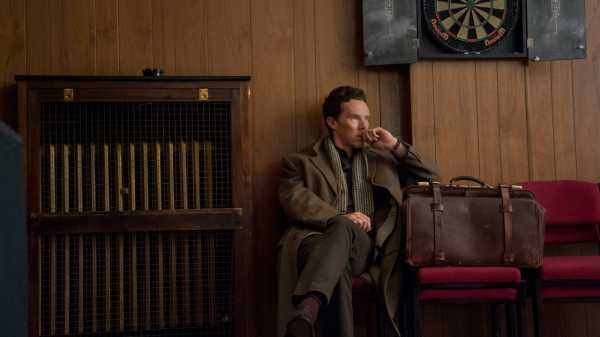
Patrick Melrose is going to be all right. We know this from the final episode of the TV series of that name, itself an adaptation of a string of novels spun from the calamitous life story of its creator, Edward St. Aubyn. The episode in question, which aired earlier this month, closed with the former junkie, occasional alcoholic, and serial philanderer (played by Benedict Cumberbatch) heading out of his London flat to go for supper with his estranged wife and their two sons. His alternatives are to bed the ridiculously young waitress who gave him her number after his mother’s funeral, earlier that day; to drink himself into a stupor; or to commit suicide. Given his colossal appetites, he might fit in all three.
Instead, one of the most self-destructive forces in fiction steps away from the ledge. The light filtering through the front door toward which Melrose walks is redemptive, the opening bars of Blur’s “Tender,” which accompany him, suitably irenic. Here’s St. Aubyn describing the same moment in “At Last,” the fifth and final Melrose book: “Instead of feeling the helplessness, he felt the helplessness and compassion for the helplessness at the same time. One followed the other swiftly, just as a hand reaches out instinctively to rub a hit shin.” But we—the reader, the viewer—know that this instinct has been hard learned. Self-preservation, compassion, and responsibility are not traditional Melrose qualities.
Not only Patrick is implicated. The class into which he was born is a frame of mind as much as an alliance of blood and money, and this he shares with other, real people—the hereditary British élite who, after acquiring their land and power by the late seventeenth century, surveyed both the masses and the emerging middle classes with egalitarian disdain. Two hundred years of dominance gave them an invincible sense of entitlement and an assumption of significance inversely proportional to their tiny number. That these assumptions were deferred to by others was a great help in fending off challenges to power; Pip’s admiration of “greatness” was a general malady.
There was, of course, a gradual slide in status. David Cannadine, in his classic “Decline and Fall of the British Aristocracy,” from 1990, argued that, beginning in the late nineteenth century, the British élite were grounded by agricultural recession, punitive taxes, and limitations on the House of Lords. But the illusion of entitlement persisted even into the Thatcher era, and this is where the St. Aubyn books resonate beyond the man who is their subject. We are all Patrick Melrose, a generation of upper-class Englishmen might have said. He is the everyman of élite vice. So what happened to them? Whither their cruelty, their decadence, their way of life?
To answer this, we need to go back to the nineteen-sixties, when the Melrose story opens. The spirit of Caligula lives on in Patrick’s father, David, who oscillates between bestiality and refinement. Bugger your five-year-old son; admire the priceless Correggio on your bedroom wall; improvise a fugue of painful beauty on the piano; force your future wife to eat on all fours, like a dog—these are just some of the highlights of David Melrose’s orgiastic riot through life, and the wilder the pendulum swings the more fixed and categorical is his loathing for middle-class morality. After raping Patrick for the first time, he reflects sadly that he won’t be able to tell his chums about it, for “even at the bar of the Cavalry and Guards Club one couldn’t boast about homosexual, paedophiliac incest with any confidence of a favourable reception.” There is little that can be said about this sentence other than that it is perfectly awful.
The odds are heavily in favor of Patrick turning out like David, for aside from the genetic inheritance, as Auden reminds us, those to whom evil is done do evil in return. As the series and the books go on, it becomes clear that Patrick has indeed inherited his father’s contaminated intellect, his sensual snobbery (“nothing but the best or go without”), and his talent for the put-down. For all his resentment of the old fiend—and of his mother, Eleanor, for refusing to see the torture he suffered as a child—much about Patrick suggests a willing catechumen at the altar of his father’s hideousness.
I know something of this world, though only vicariously, thank God. My aunt, now in her nineties, grew up partly in the house of her grandfather, the heir to an earldom. He was a nasty piece of work who took a pair of horse shears to her curls. After a drink, he would whip his butler around the dining room like a horse. Another great-grandfather was divorced by my great-grandmother on the grounds that he had stubbed out cigarettes on her and imprisoned her in the family pile in Herefordshire. A lot of my relations would have benefitted from a spell in the Priory, the mental hospital, in London, that’s favored by celebrities and by Patrick Melrose himself; one of them, the most Melrosian in bearing, style, and addictions, did.
Most significant of all, my mother’s depression, in the nineteen-eighties, led to her ostracism by former friends. Mental illness was a taboo back then, often concealed, however ineptly, by alcohol. She died by her own hand—not a uniquely upper-class fate, but most of her titled friends were conspicuously absent as her illness deepened.
But Patrick’s illness fades. In “At Last,” we begin to sense that he will not, in fact, become David. The periods without alcohol lengthen and he lurches, in the Priory, toward something like self-knowledge. His cynicism softens and he spends quite a lot of time disclosing his feelings to strangers. He is helped by a friend, Johnny Hall, who, apart from being an alumnus of the Priory, is a psychotherapist to whom Patrick confesses his childhood trauma. And Patrick does not abuse his sons; oddly enough, he regards their protection as coming within his remit.
This, finally, is where he accrues a significance far beyond himself. It’s July 29, 1981, when Patrick cremates his mother—the day, as it happens, that Prince Charles marries Lady Diana Spencer. A new Britain of confession and emotional articulacy is starting to emerge, which causes David Melrose’s old friend Nicholas Pratt to keel over in indignation at the reception after Eleanor’s funeral. In the TV series, Pratt is played with septic suavity by Pip Torrens, and is given a fitting sendoff. “As if it weren’t ludicrous enough for every child to be ‘gifted,’ ’’ runs his last tirade against the egoism and self-pity of the new age, “they now have to be ill as well: a touch of Asperger’s, a little autism . . . if they can’t confess to being abused, they must confess to being abusive.” The heart attack that follows is fatal.
Pratt would no doubt have had something cutting to say about the most recent royal wedding, with its celebrities, biracial bride, and loquacious American bishop. But most of the public, including the former upper class, enjoyed the service because of these novelties, not in spite of them. It goes to show how much Britain has changed. It wasn’t just Patrick Melrose who learned to speak about his feelings, who chose not to rely on servants to raise children. That civilizing process was something the whole of Patrick’s tribe went through, in uneasy conjunction with the rest of the country.
The circs, as Bertie Wooster would put it, were quite banal. For all but a tiny proportion of the landed nobility, the money ran out and everyone had to go to work. (Even Patrick drags himself to gainful employ, the first Melrose to do so for seven generations. He does not seem, it must be admitted, a wholly committed barrister.) Education, the means by which upper-class boys learned to suppress their emotions and to hit before being hit, was transformed. No longer is the country full of small “prep” schools that toughen up pre-teens for the rigors of the “public” school and its menu of “fagging”—a kind of class system under which younger boys did menial jobs for older ones—birching, and sodomy. Those schools that haven’t closed have reformed.
So there’s the happy ending. “There was no one to blame and everyone to help,” Patrick’s parting thought runs, “and those who appeared to deserve the most blame needed the most help.” It’s a noble sentiment, far from the old entitlement. But when we think back on St. Aubyn’s achievement—and that of Edward Berger, who directed the near-flawless TV series—it won’t be this Patrick, the salvageable one, who we’ll remember. It’ll be the stylish car crash that came before.
Patrick and his kind exert such fascination—in life, and in nine hundred pages and five hours of TV—precisely because their ghastliness is so hard to separate from their humor. Categorical, unfounded opinion—prejudice—is their preferred register, and we love it because it condemns both object and subject in the same breath. “The Great Barrier reef is the most vulgar thing I’ve ever seen,” says Kitty Harrow, during a party scene, in “Some Hope,” perhaps the most efficient demolition of the beau monde since Anthony Powell’s “A Dance to the Music of Time.” “It’s one’s worst nightmare, full of frightful loud colours, peacock blues, and impossible oranges all higgledy-piggledy while one’s mask floods,” he writes. We won’t see their like again.
Sourse: newyorker.com






